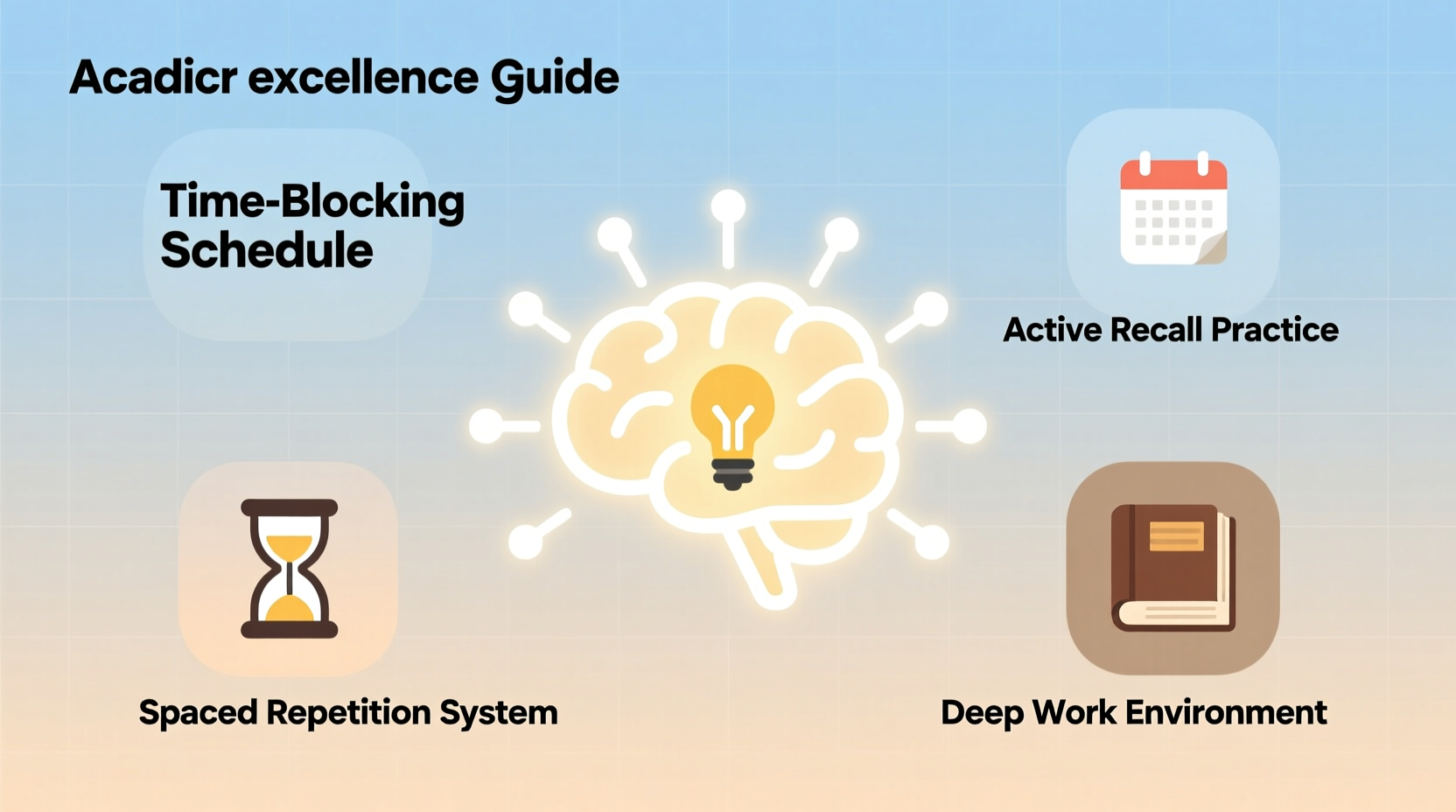Earning top grades isn’t about innate intelligence or last-minute cramming—it’s about consistent execution of disciplined, research-backed strategies. Students who regularly achieve academic excellence don’t rely on luck; they build systems that support deep learning, retention, and performance under pressure. Whether you're in high school, college, or pursuing advanced studies, the following methods have been validated by educators, cognitive scientists, and high-achieving students alike.
Master Your Schedule with Strategic Time Blocking

Time is your most valuable academic resource. The difference between average and exceptional students often lies not in how much time they spend studying, but in how effectively they use it. One of the most powerful tools for academic success is time blocking—a method where you assign specific blocks of time to focused tasks.
Instead of vague plans like “study biology,” allocate 90-minute sessions labeled “Review cellular respiration diagrams and quiz myself.” This specificity reduces decision fatigue and increases accountability. Research from Stanford University shows that students who plan their study sessions in advance are 35% more likely to retain information and perform better on exams.
Optimize Learning with Active Recall and Spaced Repetition
Passive reading and highlighting are among the least effective study techniques. In contrast, active recall—testing yourself without looking at notes—and spaced repetition—reviewing material at increasing intervals—are two of the most scientifically supported methods for long-term retention.
Start by turning lecture notes into self-test questions. For example, instead of rereading a psychology chapter, ask: “What are the three components of classical conditioning?” Then answer aloud or write them down. Combine this with spaced repetition using digital flashcards (like Anki) or a physical review calendar.
“Students who use active recall outperform peers by nearly a full letter grade on average.” — Dr. Henry Roediger, Cognitive Psychologist, Washington University
| Study Method | Effectiveness (Research-Based) | Time Efficiency |
|---|---|---|
| Rereading Notes | Low | Poor |
| Highlighting Text | Very Low | Poor |
| Practice Testing (Active Recall) | High | Excellent |
| Spaced Repetition | Very High | Excellent |
| Group Study | Moderate (if structured) | Fair |
Build Deep Understanding Through the Feynman Technique
To truly master a subject, you must be able to explain it simply. The Feynman Technique—named after Nobel laureate physicist Richard Feynman—involves four steps:
- Choose a concept you want to learn.
- Teach it to a child using plain language.
- Identify gaps in your explanation and revisit the source material.
- Simplify and reorganize your explanation.
This method forces you to move beyond memorization and develop genuine comprehension. When you can break down complex topics—like enzyme kinetics or supply-demand curves—into simple terms, you’ve achieved mastery.
Real Example: How Sarah Raised Her GPA from 3.2 to 3.9
Sarah, a sophomore biology major, struggled with organic chemistry despite studying for hours each week. She reread chapters, highlighted textbooks, and attended every lecture—but her exam scores remained below B-. Frustrated, she consulted her academic advisor, who introduced her to active recall and time blocking.
She began creating flashcards for every reaction mechanism and tested herself daily. She scheduled 90-minute study blocks five days a week, avoiding multitasking by turning off her phone. Within six weeks, her quiz averages rose from 72% to 91%. By the end of the semester, she earned an A- in the course and applied the same system to her other classes, raising her cumulative GPA significantly.
Her transformation wasn’t due to increased study time—it was due to smarter, more deliberate practice.
Essential Habits of Top-Performing Students: A Checklist
Consistency in academics comes from routine, not bursts of effort. Here’s a checklist of non-negotiable habits practiced by students who consistently earn As:
- Plan weekly study sessions every Sunday night.
- Turn lecture notes into self-test questions within 24 hours.
- Use flashcards with spaced repetition for memorization-heavy subjects.
- Review past mistakes on exams and quizzes to prevent recurrence.
- Sleep at least 7–8 hours per night—cognitive function declines sharply below this threshold.
- Attend office hours monthly, even if you feel confident in the material.
- Limit passive study (highlighting, rereading) to less than 20% of total study time.
- Break large assignments into smaller tasks with deadlines.
Avoid These Common Academic Pitfalls
Even motivated students fall into traps that undermine their performance. Recognizing these early can save semesters of frustration.
- Cramming the Night Before
- Leads to short-term retention and high stress. Information learned this way rarely transfers to long-term memory.
- Overconfidence After Easy Quizzes
- One good score doesn’t equal mastery. Continue reviewing foundational concepts even when ahead.
- Neglecting Feedback
- Ignoring comments on papers or exams means repeating the same errors. Always analyze graded work within 48 hours.
- Isolating During Study
- While solo focus is essential, strategic collaboration reinforces understanding. Join or form a disciplined study group.
FAQ: Addressing Key Academic Concerns
Can I improve my grades even if I’ve done poorly before?
Absolutely. Academic performance is not fixed. By adopting evidence-based strategies like active recall, spaced repetition, and structured planning, students routinely turn around their results within one or two semesters. What matters most is consistency moving forward, not past performance.
How many hours should I study per week for each class?
A widely accepted rule is 2–3 hours of study per week for every credit hour. For a 3-credit course, that’s 6–9 hours weekly. However, quality trumps quantity. Two hours of active recall are more effective than five hours of passive reading.
Is it possible to maintain top grades without burning out?
Yes—but only if you prioritize recovery as seriously as work. Top students schedule breaks, exercise, social time, and sleep. Chronic overwork leads to diminishing returns. Sustainable excellence includes deliberate rest.
Conclusion: Excellence Is a Practice, Not a Goal
Getting As consistently isn’t about perfection—it’s about process. The most successful students aren’t always the smartest; they’re the ones who show up with a plan, use proven learning techniques, and refine their approach based on feedback. You don’t need a genius IQ or endless willpower. You need a system.
Start small: pick one strategy from this article—time blocking, active recall, or the Feynman Technique—and implement it rigorously for two weeks. Track your focus, retention, and confidence. Then layer in another. Over time, these practices compound into academic excellence that feels natural, not exhausting.









 浙公网安备
33010002000092号
浙公网安备
33010002000092号 浙B2-20120091-4
浙B2-20120091-4
Comments
No comments yet. Why don't you start the discussion?